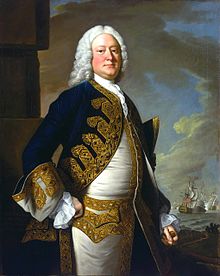John Byng
| John Byng | |
|---|---|

Portrait of John Byng by Thomas Hudson, 1749
|
|
| Born | baptised 29 October 1704 Southhill, Bedfordshire, England |
| Died | 14 March 1757 (aged 52) Portsmouth, England |
| Allegiance |
|
| Service/branch |
|
| Years of service | 1718 - 1757 |
| Rank | Admiral |
| Battles/wars | |
Admiral John Byng (baptised 29 October 1704 – 14 March 1757) was a Royal Navy officer. After joining the navy at the age of thirteen, he participated at the Battle of Cape Passaro in 1718. Over the next thirty years he built up a reputation as a solid naval officer and received promotion to vice-admiral in 1747. He also served as Commodore-Governor of Newfoundland Colony in the 1740s, and was a Member of Parliament from 1751 until his death.
Byng is best known for failing to relieve a besieged British garrison during the Battle of Minorca at the beginning of the Seven Years' War. Byng had sailed for Minorca at the head of a hastily assembled fleet of vessels, some of which were in poor condition. He fought an inconclusive engagement with a French fleet off the Minorca coast, and then elected to return to Gibraltar to repair his ships. Upon return to Britain, Byng was court-martialled and found guilty of failing to "do his utmost" to prevent Minorca falling to the French. He was sentenced to death and shot by firing squad on 14 March 1757.
John Byng was born in the village of Southhill, Bedfordshire in England, the fifth son of Rear-Admiral Sir George Byng (later Admiral the 1st Viscount Torrington). He entered the Royal Navy in March 1718, aged 13, when his father was a well-established admiral at the peak of a uniformly successful career. George Byng had supported King William III in his successful bid to be crowned King of England in 1689 and had seen his own stature and fortune grow. He was a highly skilled naval commander, had won distinction in a series of battles, and was held in esteem by the monarchs whom he served. In 1721, he was rewarded by King George I with a viscountcy, being created Viscount Torrington.
...
Wikipedia
